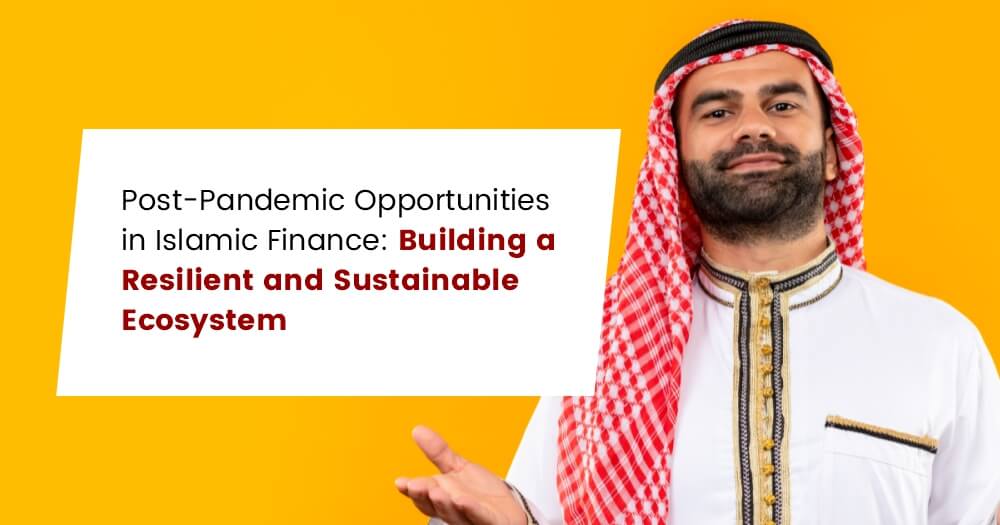The global financial landscape underwent a seismic shift during the COVID-19 pandemic, testing the resilience of economies and financial institutions worldwide. The pandemic caused widespread economic turmoil, affecting industries, businesses, and livelihoods at an unprecedented scale. As we navigate the post-pandemic era, the long-term effects of these disruptions continue to shape the global financial system, emphasizing the need for recovery, adaptation, and innovationGovernments introduced stimulus measures and central banks slashed interest rates to stabilize economies, but vulnerabilities in traditional financial systems were exposed, especially in areas heavily reliant on speculative and interest-based mechanisms.
Islamic finance, with its unique principles rooted in ethical investment and risk-sharing, provided a promising alternative to address these challenges. Unlike conventional systems, it promotes equity and mutual responsibility, ensuring that financial activities contribute positively to society and the real economy. For instance, Islamic financial instruments prioritize asset-backed transactions and prohibit excessive speculation, aligning well with the need for stability during turbulent times.
In this article, we delve into the transformative opportunities that have emerged for Islamic finance post-pandemic. By examining its principles, innovations, and real-world applications, we explore how this industry is poised to lead the way in building a resilient and sustainable financial ecosystem that not only recovers but thrives in the post-pandemic world.
The Impact of the COVID-19 Pandemic on Global Economies

The COVID-19 pandemic disrupted global supply chains, destabilized financial markets, and created unprecedented levels of uncertainty. Businesses faced liquidity challenges, governments struggled with fiscal deficits, and unemployment rates soared. While conventional financial systems relied heavily on interest-based lending and speculative instruments, these approaches revealed vulnerabilities during times of crisis.
Islamic finance, which prohibits interest (riba), excessive uncertainty (gharar), and speculative transactions (maysir), offered an ethical and stable alternative. By emphasizing shared risk and profit-and-loss sharing, Islamic financial products align well with the principles of social responsibility and economic equity. This foundation makes Islamic finance a viable model for rebuilding and stabilizing economies in the post-pandemic era.
Key Principles of Islamic Finance Driving Post-Pandemic Recovery
1. Risk Sharing and Profit Loss Sharing
Islamic finance is based on risk-sharing contracts, such as mudarabah (profit-sharing) and musharakah (joint partnership). These contracts encourage equitable risk distribution, fostering trust between parties and reducing systemic vulnerabilities. Mudarabah allows one party to provide capital while the other manages the business, with profits shared according to a pre-agreed ratio. Losses, however, are borne solely by the capital provider unless negligence is involved, ensuring accountability. Similarly, musharakah fosters collaboration by pooling resources and expertise, making it particularly suitable for large-scale projects and partnerships.
During the pandemic, these principles proved advantageous as they mitigated financial risks for struggling businesses while promoting mutual support. Moving forward, the adoption of risk-sharing mechanisms can drive economic recovery by encouraging entrepreneurship, innovation, and equitable wealth distribution. By aligning incentives and fostering cooperation, these models contribute to a stable and resilient financial ecosystem.
2. Asset-Backed Financing
Unlike conventional finance, Islamic finance is tied to tangible assets. This ensures that financial transactions contribute directly to the real economy, promoting sustainable growth and minimizing speculative risks.
3. Ethical Investments
Islamic finance prioritizes investments in industries and projects that benefit society, such as healthcare, education, and infrastructure. Post-pandemic, this focus is critical in rebuilding economies while ensuring social welfare.
4. Social Justice and Economic Inclusion
By promoting zakat (obligatory charity) and qard al-hasan (interest-free loans), Islamic finance addresses social disparities and supports vulnerable populations, aiding in poverty alleviation and economic inclusion.
Emerging Opportunities in Islamic Finance Post-Pandemic
1. Green and Sustainable Finance
The pandemic underscored the importance of environmental sustainability. Islamic finance can play a pivotal role in promoting green initiatives by aligning with the principles of maqasid al-Shariah (objectives of Islamic law), which emphasize environmental stewardship.
- Green Sukuk: Islamic bonds (sukuk) have been increasingly used to finance eco-friendly projects, such as renewable energy and sustainable infrastructure. Post-pandemic, the demand for green sukuk is expected to surge as governments and institutions prioritize sustainability.
- Sustainable Development Goals (SDGs): Islamic finance aligns naturally with the United Nations SDGs, particularly in areas like clean energy, poverty alleviation, and sustainable cities. The core principles of Islamic finance, such as ethical investment, risk-sharing, and social justice, make it an ideal partner in achieving these global objectives. Institutions can leverage Islamic financial instruments like sukuk (Islamic bonds) and waqf (endowments) to fund projects directly addressing the SDGs. For example, green sukuk can be issued to finance renewable energy initiatives, while waqf funds can be allocated to build sustainable urban infrastructure or provide education to underserved communities.
Furthermore, Islamic finance emphasizes environmental stewardship through its alignment with maqasid al-Shariah (objectives of Islamic law), which include the preservation of wealth, life, and the environment. By integrating these principles into SDG-focused projects, Islamic financial institutions can create a lasting impact. Governments and private sector entities can collaborate with Islamic finance providers to mobilize resources for climate-resilient infrastructure, sustainable agriculture, and poverty eradication initiatives. This holistic approach ensures that economic development does not compromise environmental and social well-being, creating a balanced pathway toward achieving the SDGs.
2. Technological Innovation and Fintech Integration

Technology played a crucial role in ensuring business continuity during the pandemic. The integration of fintech with Islamic finance offers numerous opportunities to enhance accessibility, efficiency, and innovation.
- Blockchain Technology: Blockchain can revolutionize Islamic finance by enhancing transparency, reducing costs, and ensuring Shariah compliance through automated smart contracts.
- Digital Banking: With the rise of digital platforms, Islamic financial institutions can expand their reach, offering inclusive services to underbanked populations in emerging markets.
- AI and Big Data: These technologies can optimize risk assessment, improve customer experiences, and drive innovation in product offerings.
3. Shariah-Compliant Healthcare Financing
Healthcare systems worldwide faced immense pressure during the pandemic. Islamic finance can support the development of robust healthcare infrastructure through Shariah-compliant financing models.
- Waqf (Endowment): Waqf funds can be directed toward building hospitals, funding medical research, and providing essential healthcare services.
- Musharakah Partnerships: Joint ventures between Islamic financial institutions and healthcare providers can facilitate the expansion of medical facilities and services.
4. Microfinance and Economic Inclusion
Small and medium enterprises (SMEs) were among the hardest hit during the pandemic. Islamic microfinance offers a lifeline to these businesses, fostering economic inclusion and job creation.
- Qard al-Hasan Loans: Interest-free loans can support SMEs in rebuilding operations and sustaining employment.
- Empowering Women Entrepreneurs: Islamic microfinance programs tailored to women can contribute to gender equality and economic growth.
Challenges and Solutions in Building a Resilient Ecosystem
While the opportunities are significant, the Islamic finance industry must address several challenges and impact to fully realize its potential in the post-pandemic world.
1. Standardization and Harmonization
The lack of uniform Shariah standards across jurisdictions can create confusion and hinder growth. Collaborative efforts among regulators, scholars, and institutions are needed to develop global standards.
2. Awareness and Education
Many individuals and businesses remain unaware of the benefits of Islamic finance. Comprehensive education and awareness campaigns can bridge this gap and encourage adoption.
3. Regulatory Support
Supportive regulatory frameworks are essential to fostering innovation and growth in Islamic finance. Policymakers must ensure a conducive environment for Shariah-compliant financial activities.
4. Talent Development
The industry requires skilled professionals who understand both Islamic finance principles and modern financial practices. Investment in education and training programs is crucial to building a knowledgeable workforce.
The Role of Islamic Finance in Shaping the Future
Islamic finance is poised to play a significant role in shaping the future, especially in the wake of the post-pandemic world. Its ethical foundation, commitment to social justice, and emphasis on sustainability are increasingly relevant in today’s global landscape, where there is a growing demand for responsible, inclusive, and ethical financial systems. As we move toward economic recovery, Islamic finance offers solutions that can drive growth while addressing both societal and environmental challenges.
Key aspects of how Islamic finance can contribute to the future include:
- Ethical Foundation:
Islamic finance is grounded in ethical principles that prohibit interest (riba), uncertainty (gharar), and unethical investments. This focus on fairness ensures that financial transactions contribute positively to society and avoid harmful practices, promoting trust and stability within the financial system.
Its emphasis on risk-sharing over risk-transfer fosters equitable partnerships between lenders and borrowers, creating a more balanced and resilient financial ecosystem.
- Social Justice and Inclusion:
Islamic finance promotes social justice by ensuring that financial services are accessible to all, particularly marginalized and underserved communities.
The principles of zakat (charity) and redistribution of wealth within Islamic finance systems encourage poverty alleviation, contributing to greater economic equality and social welfare.
- Focus on Sustainability:
Sustainability is a core tenet of Islamic finance, with its focus on financing environmentally and socially responsible projects. This includes investments in renewable energy, sustainable agriculture, and green technologies, aligning with global efforts to combat climate change and build a sustainable future.
Sharia-compliant financing mechanisms such as Sukuk (Islamic bonds) are increasingly being used to fund large-scale infrastructure projects that benefit society while adhering to sustainability standards.
- Leveraging Technological Innovation:
The growing integration of technology in Islamic finance can revolutionize the industry, making services more accessible and efficient. Blockchain, artificial intelligence, and digital platforms can improve transparency, reduce costs, and enhance customer experience, while maintaining the ethical principles of Islamic finance.
Fintech innovation in Islamic finance can also enable greater financial inclusion, particularly for those without access to traditional banking systems.
- Fostering Collaboration and Partnership:
Collaboration between Islamic financial institutions and conventional financial systems can create a more diversified and inclusive global financial market. By pooling resources and expertise, Islamic finance can help drive innovation, bring about new solutions, and improve financial stability.
Interdisciplinary collaboration with other sectors such as technology, healthcare, and education can result in financing that supports long-term economic development and societal progress.
- Addressing Industry Challenges:
One of the challenges faced by Islamic finance is the need for greater standardization and regulation across different jurisdictions. Efforts to harmonize Islamic finance practices and create more cohesive frameworks can drive industry growth and attract a broader base of investors.
There is also a need to raise awareness and educate individuals and institutions about the benefits and principles of Islamic finance, expanding its reach to more regions and populations.
In Conclusion
The post-pandemic era presents a unique and exciting chance for Islamic finance to show how it can make a real difference in people’s lives and the global economy. By concentrating on areas like protecting the environment, using new technology, improving healthcare, and helping everyone get a fair chance in the economy, Islamic finance can help the world recover and grow stronger after the challenges of the pandemic.
To achieve this, everyone involved in Islamic finance from business leaders to government officials needs to work together. They must focus on coming up with fresh ideas, creating rules that work everywhere, and teaching people about the benefits of Islamic finance. When these steps are taken, Islamic finance will not just survive tough times but will become a leader in building a world where businesses, communities, and the environment can all thrive together.



